 According to a Los Angeles Times "Debate scorecard," the opening segment of last week's third and final Presidential debate, concerning the respective nominees plans for appointments to the U.S. Supreme Court, was a "draw."
According to a Los Angeles Times "Debate scorecard," the opening segment of last week's third and final Presidential debate, concerning the respective nominees plans for appointments to the U.S. Supreme Court, was a "draw."
Three of the paper's pundits each proffered what at best could be described as a superficial one-paragraph explanation for their verdict: It was a "draw" because 1) an ordinarily unhinged Trump was "calm" and "sedate," and 2) by describing what they would look for in a nominee to SCOTUS, both candidates had appealed to their respective conservative Republican and liberal Democratic bases.
The "Debate scorecard" presents a classic example of what Bill Moyers derides as the "charade of fair and balanced --- by which two opposing people offer competing opinions with a host who assumes the viewer will arrive at the truth by splitting the difference" --- an unacceptable "substitute for independent analysis." Combined with the "draw" assessment, this form of irresponsible punditry lends itself to the false equivalency separately offered by FiveThirtyEight's Oliver Roeder, who suggested that both candidates were "promising an extreme candidate" to fill the vacancy left by the death of the late Supreme Court Justice Antonin Scalia.
In truth, the differences between the two Presidential nominees are profound. They represents the difference between oligarchy (Trump) and democracy (Clinton). Trump's preference for a judiciary that would protect the privileged few at the expense of the vast majority of ordinary Americans is both extreme and unpopular. Clinton's egalitarian criteria for judicial nominations is immensely popular and decidedly mainstream. There is nothing "extreme" about a jurist who is committed to the words that appear above the entrance to the U.S. Supreme Court: "Equal Justice Under Law."
What is especially troubling is that media pundits have erected a false equivalency on an issue of vital importance to the American electorate. Outside of global climate change, which threatens the very survival of humanity, the issue of what could turn out to be as many as three lifetime appointments to the Supreme Court over the next four years is amongst the most monumental that voters will face on Nov. 8. As we previously reported the fate of democracy itself is at stake.
Roeder and the three L.A. Times pundits would have understood that if they had bothered to either consult constitutional scholars or specific issue polls before erecting their false equivalency in their respective debate analyses...
'Radicals in Robes'
"If Hillary Clinton had wanted to put some meat on her charge of a 'vast right-wing conspiracy,' she should have had a list of Federalist Society members and she could have spun a more convincing story." - Grover Norquist
Trump has made no bones about it. He would nominate another Antonin Scalia. Like Scalia, all of the "jurists" on Trump's list are affiliated with the Federalist Society.
Perhaps the most telling feature about the Federalist Society --- aside from the fact that it is funded by right-wing billionaires, like the Koch brothers --- lies in its adherence to the oligarchic principles of its founder, Robert Bork.
Bork's and his group's dangerous reactionary views were touched upon by Senator Ted Kennedy's remarks during the floor debate over Bork's unsuccessful 1987 nomination to the U.S. Supreme Court by President Ronald Reagan:
In choosing Robert Bork, President Reagan has selected a nominee who is unique in fulminating opposition to fundamental constitutional principles as they are broadly understood in our society.
He has expressed opposition time and again, in a long line of attacks on landmark Supreme Court decisions protecting civil rights, the rights of women, the right to privacy and other individual rights and liberties. Judge Bork may be President Reagan’s ideal ideological choice…but that choice is not acceptable to Congress and the country, and it is not acceptable in a Justice of the nation’s highest court.
Unfortunately, over the next three decades, the GOP was so successful in packing our courts with Federalist Society extremists, whom Law Professor Cass Sunstein aptly described as Radicals in Robes, that what was considered extreme and unacceptable in 1987 has become, in the minds of unthinking media pundits, common place, even mainstream in 2016. Thus we find pundits erecting a false equivalency when either a Bernie Sanders or a Hillary Clinton challenges a multitude of infamously anti-democratic decisions, like the infamous Citizens United decision, which permits powerful corporations to purchase the best oligarchy money can buy.
Clinton positions immensely popular
During the debate, Hillary Clinton said:
(During her Acceptance Speech Clinton also said she would like to see the Court overturn Shelby County, the infamous 5-4 decision in which the radical right wing majority gutted a key provision of the Voting Rights Act. Unfortunately, in the compressed time afforded, Hillary failed to repeat that stance during the debate, despite widespread voter suppression laws enacted by Republican states in its wake.)
Donald Trump stated: "The Justices that I am going to appoint will be pro-life. They will have a conservative bent. The will be protecting the Second Amendment." He later added that he favored overturning Roe v. Wade and that he was "very proud to have the endorsement of the NRA." He made no effort to dispute Hillary's claim that he supported Citizens United and the policy position of right-wing jurists who favor powerful corporations and the wealthy over the interests of ordinary citizens.
While there can be no doubt that Trump's pro-oligarchy and anti-Roe v. Wade agenda appealed to his narrow GOP base, issue polls reveal that Clinton's outlook, by contrast, connects with broad majorities of the American people.
Seventy-eight percent (78%) of the American electorate want Citizen United to be overturned. Citing poll numbers, last November The Washington Post reported: "Across party lines, Americans believe that our economic system is rigged to favor the wealthy and big corporations, and that our political system is, too." The Post added that "anti-corporate and more economically egalitarian sentiments have been rising in both parties." Translation: Trump and the GOP's extreme-right oligarchic agenda is immensely unpopular.
While Trump's anti-abortion stance* no doubt appeals to right-wing Christians, it is a position that ignores the 70% of Americans who do not wish to see the right to reproductive choice, as guaranteed via Roe v. Wade, overturned.
* (Trump displayed a profound ignorance of anatomy. If a physician surgically removes a baby one day prior to its due-date, as he charged is done in late-term abortions, it's called a C-Section; not an abortion).
Similarly, sixty percent of Americans favor marriage equality.
Trump's boast that he received the endorsement of the NRA should have but did not receive adequate media scrutiny.
The NRA is on record as opposing background checks. Ninety-two percent of gun owners --- including huge majorities of both Republicans and even NRA members --- favor universal instant background checks and closure of the so-called gun show and online loopholes. The NRA opposes bans on assault weapons with large magazines. Fifty-seven percent of all Americans favor an assault weapons ban.
By failing to place Clinton's Supreme Court nominee criteria within the context of these issue polls, mainstream media pundits have contributed to what Noam Chomsky described as the "democracy deficit" --- the significant gap between the policy positions of the electorate and their elected "representatives."
Where a candidate's views expressed in a debate mirror those of a super-majority amongst the electorate, that is news that ought to be accurately reported.
Responsible print journalism
It is unclear whether or not this shallow punditry was simply the product of the type of contemporaneous musings one sees on Twitter while a debate is in progress. Either way, what followed was a sorry substitute for genuine journalism. The Times' "Debate Scorecard" ran in the print edition of the paper. So an excuse of a quick live take during the proceedings is hardly an excuse for failing to accurately inform the public.
Unlike television, where pundits are called upon to provide instantaneous post-debate analysis, print journalists have the time to consult experts in a given field, reflect upon and even do some level of online research (issue polls) before "grading" the likely impact of competing substantive policy positions proffered during a debate.
Of course, it is quite possible that the three LA Times' pundits faced a submission deadline. But if that were the case, the fault would simply lie with their employer. Print journalism should be more concerned about accuracy and the avoidance of false equivalency than expediency in its debate analysis.
Ernest A. Canning is a retired attorney, author, Vietnam Veteran (4th Infantry, Central Highlands 1968) and a Senior Advisor to Veterans For Bernie. He has been a member of the California state bar since 1977. In addition to a juris doctor, he has received both undergraduate and graduate degrees in political science. Follow him on twitter: @cann4ing


 A Pretty Weak 'Strongman': 'BradCast' 10/30/25
A Pretty Weak 'Strongman': 'BradCast' 10/30/25 'Green News Report' 10/30/25
'Green News Report' 10/30/25
 Proposal for 'First Politically Viable Wealth Tax' Takes Shape in CA: 'BradCast' 10/29/25
Proposal for 'First Politically Viable Wealth Tax' Takes Shape in CA: 'BradCast' 10/29/25 Monster Storm, Endless Wars, Gamed Elections:
Monster Storm, Endless Wars, Gamed Elections: 'Green News Report' 10/28/25
'Green News Report' 10/28/25 Let's Play 'Who Wants
Let's Play 'Who Wants Sunday 'Cartoonists Dilemma' Toons
Sunday 'Cartoonists Dilemma' Toons Exiled NOAA Scientists Resurrect Critical Disaster Database: 'BradCast' 10/23/25
Exiled NOAA Scientists Resurrect Critical Disaster Database: 'BradCast' 10/23/25  'Green News Report' 10/23/25
'Green News Report' 10/23/25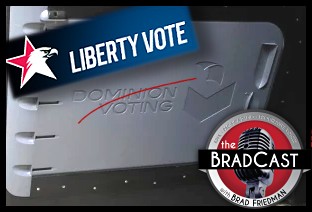 Trump-Allied GOP Partisan Buys Dominion Voting Systems: 'BradCast' 10/22/25
Trump-Allied GOP Partisan Buys Dominion Voting Systems: 'BradCast' 10/22/25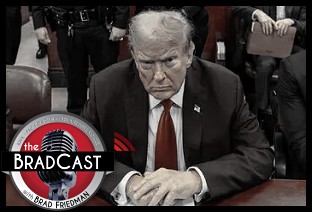 Trump, Republican Law(lessness) & (Dis)Order: 'BradCast' 10/21/25
Trump, Republican Law(lessness) & (Dis)Order: 'BradCast' 10/21/25 'Green News Report' 10/21/25
'Green News Report' 10/21/25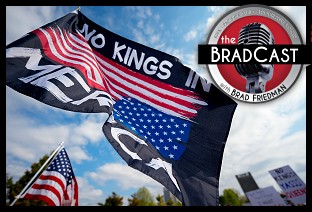 Celebrating 'No Kings': 'BradCast' 10/20/25
Celebrating 'No Kings': 'BradCast' 10/20/25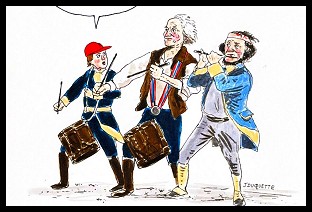 Sunday 'How It Started' Toons
Sunday 'How It Started' Toons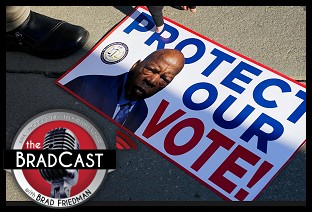 SCOTUS Repubs Appear Ready to Gut Rest of Voting Rights Act: 'BradCast' 10/16/25
SCOTUS Repubs Appear Ready to Gut Rest of Voting Rights Act: 'BradCast' 10/16/25 'Green News Report' 10/16/25
'Green News Report' 10/16/25 The 'Epstein Shutdown' and Other Autocratic Nightmares: 'BradCast' 10/15/25
The 'Epstein Shutdown' and Other Autocratic Nightmares: 'BradCast' 10/15/25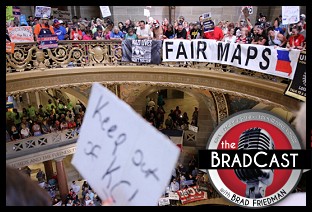 Group Vows to Block MO's GOP U.S. House Gerrymander: 'BradCast' 10/14/25
Group Vows to Block MO's GOP U.S. House Gerrymander: 'BradCast' 10/14/25 Trump Labor Dept. Warns Trump Policies Sparking Food Crisis: 'BradCast' 10/9/25
Trump Labor Dept. Warns Trump Policies Sparking Food Crisis: 'BradCast' 10/9/25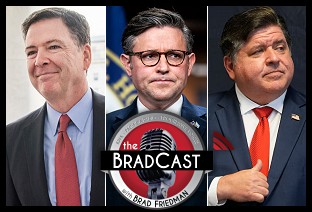 Trump's Losing Battles: 'BradCast' 10/8/25
Trump's Losing Battles: 'BradCast' 10/8/25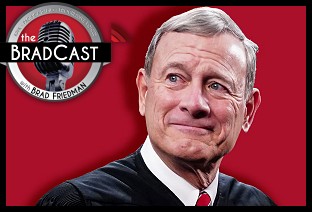 Trump, Roberts and His Stacked, Packed and Captured SCOTUS: 'BradCast' 10/7/25
Trump, Roberts and His Stacked, Packed and Captured SCOTUS: 'BradCast' 10/7/25 Trump Attempting His 'Invasion from Within': 'BradCast' 10/6/25
Trump Attempting His 'Invasion from Within': 'BradCast' 10/6/25 Biden Budget Expert: Mass Firings in Shutdown 'Illegal': 'BradCast' 10/2/25
Biden Budget Expert: Mass Firings in Shutdown 'Illegal': 'BradCast' 10/2/25 Why is DOJ Suing 'Blue' States for Their Voter Databases?: 'BradCast' 10/1/25
Why is DOJ Suing 'Blue' States for Their Voter Databases?: 'BradCast' 10/1/25
 VA GOP VOTER REG FRAUDSTER OFF HOOK
VA GOP VOTER REG FRAUDSTER OFF HOOK Criminal GOP Voter Registration Fraud Probe Expanding in VA
Criminal GOP Voter Registration Fraud Probe Expanding in VA DOJ PROBE SOUGHT AFTER VA ARREST
DOJ PROBE SOUGHT AFTER VA ARREST Arrest in VA: GOP Voter Reg Scandal Widens
Arrest in VA: GOP Voter Reg Scandal Widens ALL TOGETHER: ROVE, SPROUL, KOCHS, RNC
ALL TOGETHER: ROVE, SPROUL, KOCHS, RNC LATimes: RNC's 'Fired' Sproul Working for Repubs in 'as Many as 30 States'
LATimes: RNC's 'Fired' Sproul Working for Repubs in 'as Many as 30 States' 'Fired' Sproul Group 'Cloned', Still Working for Republicans in At Least 10 States
'Fired' Sproul Group 'Cloned', Still Working for Republicans in At Least 10 States FINALLY: FOX ON GOP REG FRAUD SCANDAL
FINALLY: FOX ON GOP REG FRAUD SCANDAL COLORADO FOLLOWS FLORIDA WITH GOP CRIMINAL INVESTIGATION
COLORADO FOLLOWS FLORIDA WITH GOP CRIMINAL INVESTIGATION CRIMINAL PROBE LAUNCHED INTO GOP VOTER REGISTRATION FRAUD SCANDAL IN FL
CRIMINAL PROBE LAUNCHED INTO GOP VOTER REGISTRATION FRAUD SCANDAL IN FL Brad Breaks PA Photo ID & GOP Registration Fraud Scandal News on Hartmann TV
Brad Breaks PA Photo ID & GOP Registration Fraud Scandal News on Hartmann TV  CAUGHT ON TAPE: COORDINATED NATIONWIDE GOP VOTER REG SCAM
CAUGHT ON TAPE: COORDINATED NATIONWIDE GOP VOTER REG SCAM CRIMINAL ELECTION FRAUD COMPLAINT FILED AGAINST GOP 'FRAUD' FIRM
CRIMINAL ELECTION FRAUD COMPLAINT FILED AGAINST GOP 'FRAUD' FIRM RICK SCOTT GETS ROLLED IN GOP REGISTRATION FRAUD SCANDAL
RICK SCOTT GETS ROLLED IN GOP REGISTRATION FRAUD SCANDAL VIDEO: Brad Breaks GOP Reg Fraud Scandal on Hartmann TV
VIDEO: Brad Breaks GOP Reg Fraud Scandal on Hartmann TV RNC FIRES NATIONAL VOTER REGISTRATION FIRM FOR FRAUD
RNC FIRES NATIONAL VOTER REGISTRATION FIRM FOR FRAUD EXCLUSIVE: Intvw w/ FL Official Who First Discovered GOP Reg Fraud
EXCLUSIVE: Intvw w/ FL Official Who First Discovered GOP Reg Fraud GOP REGISTRATION FRAUD FOUND IN FL
GOP REGISTRATION FRAUD FOUND IN FL

































